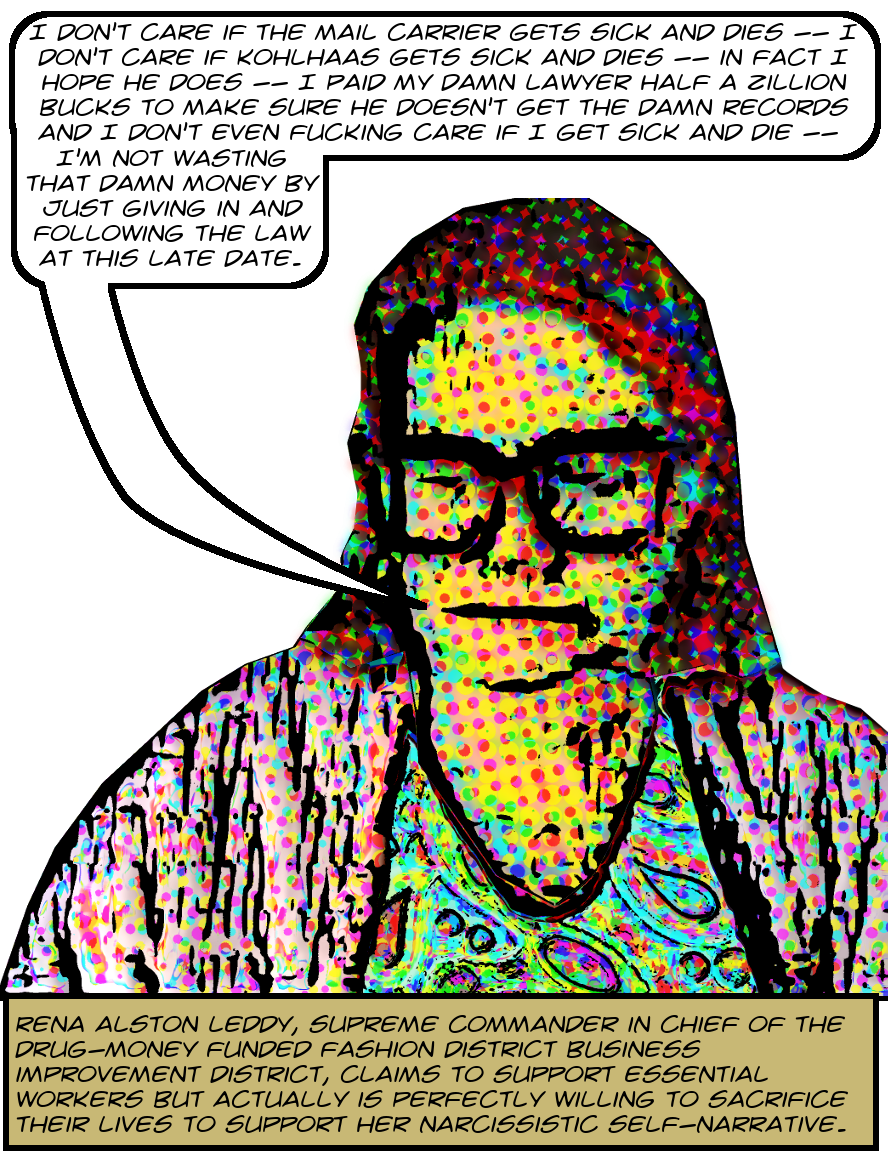 All over the State of California local agencies are using the COVID-19 pandemic as an excuse to deny the public access to records required by the California Public Records Act. I don’t, therefore, have nearly as much material to write about so in response I’m writing about the lack of records instead, and the various ways agencies deny access. Here are the first and also the second post not to mention the third posts in this series, and you’re reading the fourth!
All over the State of California local agencies are using the COVID-19 pandemic as an excuse to deny the public access to records required by the California Public Records Act. I don’t, therefore, have nearly as much material to write about so in response I’m writing about the lack of records instead, and the various ways agencies deny access. Here are the first and also the second post not to mention the third posts in this series, and you’re reading the fourth!
Rena Leddy, supreme commander of the cartel-drug-money-funded criminal conspiracy known as the Fashion District Business Improvement District, refuses to let members of the public inspect records in person due to the pandemic, which may well be fine and normal.1 But she also insists that in order to protect public health and safety the only way for requesters to get access to electronic records is to mail her a brand new unopened USB drive onto which she will copy the records and mail it back.
This is an element of her pre-COVID program of obstructing access to records by making the process as onerous and costly as possible. But obviously any method which requires physical objects to be transferred between strangers is more likely to transmit disease than a method which does not. This is true not only for the people exchanging the objects but also for all the intermediaries, like mail carriers, mail sorters, staff members who have to open the envelopes, and so on.
Leddy is willing to increase the risk of disease and therefore death for requesters, essential workers, her own staff, and herself for the sole reason of delaying and obstructing access to records, and to do so in the name of protecting their safety. When confronted with these facts Leddy declined to contradict them, merely stating that the narrative was “out of control.” And it’s certainly out of her control, but where’s the lie, Ms. Leddy?
As you might imagine there’s a lot of backstory here. First of all, the tactic of requiring requesters to receive physical copies of electronic records via unused USB drives sent through the mail is the idea of Carol Humiston, the world’s angriest CPRA attorney. Humiston openly admits that the whole point of this is to make requesters pay and pay and pay.
The CPRA, on the other hand, forbids public entities such as business improvement districts from charging more than the direct cost of duplication for copies.2 It also forbids public entities such as Leddy’s BID from charging requesters to inspect records. Finally, the CPRA requires public entities to allow requesters to make copies of records using their own equipment. This last bit was added to the CPRA in 2019 and took effect on January 1, 2020.
The Fashion District did comply with this new requirement before the pandemic but now they’ve dropped it from their list of options. The pre-pandemic policy involved the BID copying the records onto a USB drive and allowing requesters to come in to their office in person and use the USB drive on the requester’s own computer to inspect and copy.
This policy complies with a strict3 reading of the law but allowed the BID to continue to require in-person inspection, thus continuing to serve their ultimate goal of making access to records as costly to requesters as possible.4 The big difference now is that Leddy has abandoned whatever moral sense she had left and is now making access to records as costly as possible not only for requesters but for USPS employees, her own staff, and herself as well.
I guess there’s something admirable in her being willing to increase her own chance of death to serve the unholy agenda of zillionaires who employ her, but there’s nothing at all good about increasing the risk to requesters or otherwise uninvolved postal employees. But if she had the sense of shame to understand that she would have quit her job years ago, so here we are.
Let’s close with the incomparable Kitty Wells, who cut right to the point with the essential question, which is Will Your Lawyer Talk To God For You?
Image of Rena Elston Leddy is ©2020 MichaelKohlhaas.Org and I forget, well, you know, I forgot it already!
- I’m not a lawyer so I don’t want to say for sure. But I don’t personally want to inspect records in person right now so I’m not going to argue the point. At least not right now.
- See the CPRA at §6253.9(a)(2).
- And probably wrong.
- Prior to January 1, 2020 the BID, on the explicit instructions of Carol Humiston, refused to allow requesters to use their own USB drives or to use the BID’s USB drives in their own computers. They cited security concerns to justify this policy even though all security concerns could easily have been obviated by transferring electronic records remotely like everyone else in the world has been doing since around 1985.
